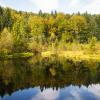
Modern, target-oriented research and quality education, more exchange with international peers and partners, better science-policy interaction, and improved coordination and communication with international and national actors are crucial for ensuring a sustainable future of Ukraine’s forests.
Forests in Ukraine make up about 16.5% of the country’s territory and fulfil important functions including support of rural livelihoods, conservation of biodiversity, and protection of agricultural land against erosion.
Currently, they are heavily impacted by two main factors: climate change and the ongoing war. In addition to the degradation and dieback of forests as a result of storms, pests, diseases, and wildfires, the war has damaged large areas of forests and made them inaccessible due to contamination with unexploded ordinance. The war also disrupted research and education infrastructure, including the regular collection of forest-related data, and led to the displacement of forest scientists and students to other parts of the country or abroad.
Robust science, strong policy support, and quality forest education are needed to tackle these challenges. However, forest research and education are struggling in Ukraine. Main challenges include strengthening research capacity for addressing priority research areas and underrepresented research fields; maintaining, circulating, and digitalizing quality research data; promoting excellence in forest science; involving researchers in networks and collaboration; and, more generally, the need for more science-based policymaking and forest management on the ground.
There is also a clear need to increase the attractiveness of forestry program and careers, for example, by adapting university curricula to include more environmental, social, and political sciences, facilitate more exchange with international and national peers and networks, improve English language skills, and offer more practical experience. Moreover, there is often a lack of awareness of existing opportunities of collaboration and a lack of capacity to participate in international projects, or the absence of topics related to Ukraine in the projects.
These and other major challenges were identified during a two-day hybrid Forum on Ukraine Forest Science and Education: Needs and Priorities for Collaboration on 21-22 November 2023 at the IIASA premises in Laxenburg, Austria. The event was organized jointly by IIASA, the National University of Life and Environmental Sciences of Ukraine (NUBiP), and the International Union of Forest Research Organizations (IUFRO), with support from the Austrian Federal Ministry for Agriculture, Forestry, Regions, and Water Management (BML).
“The forum brought together Ukrainian forestry students, early and mid-career forest researchers, and representatives of leading European universities and international institutions to discuss practical measures and strategic steps toward supporting sustainable forest management in Ukraine,” notes Forum Chair, Sergiy Zibtsev (NUBiP/IIASA).
“International collaboration in science and education is crucial to overcome the challenges posed by war and climate change. When planning this forum, keeping in mind the background and missions of the host organizations NUBiP, IIASA, and IUFRO, a deliberate decision was therefore made to focus on forest research and education needs and priorities of Ukraine to address a gap in ongoing international collaborative efforts,” explains Alexander Buck, Executive Director of IUFRO.
“An integrated and systems-based approach is suggested to support forest science and – together with a healthy forest education system – prepare the sector for speedy recovery now to ensure forest restoration in the mid- to long-term,” says Florian Kraxner, who leads the Agriculture, Forestry, and Ecosystem Services Research Group in the IIASA Biodiversity and Natural Resources Program.
To address these and other priority areas for international collaboration identified at the forum, participants suggested a series of ad hoc and mid-term activities considering impact, budget needs, and ease of implementation to enhance international collaboration. A report summarizing the main outcomes of the Forum will soon be published and shared widely with the intent of mobilizing coordinated and impactful action by stakeholders and policymakers in support of forest science and education in Ukraine.
Visit the event pages at:
Forum on Ukraine Forest Science and Education: Needs and Priorities for Collaboration | IIASA
News

10 July 2024
Latest European Demographic Data Sheet highlights lasting impact of war and migration

29 March 2024
The future of Ukrainian forests: setting priorities for action

05 March 2024

